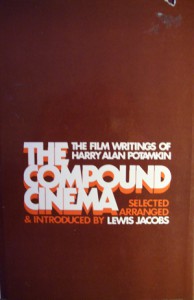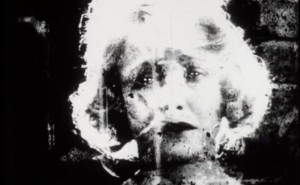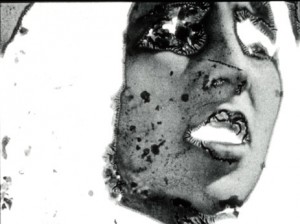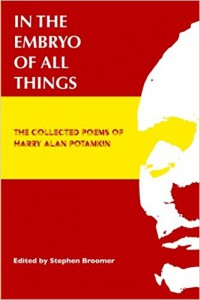It’s hard to think of a major American film critic who’s more flagrantly neglected than Harry Alan Potamkin (1900-1933), a globetrotting Marxist poet and intellectual whose prodigious output as a critic, found in the over 600 pages of The Compound Cinema (New York and London: Teachers College Press [Columbia University], 1977) — a posthumous collection edited by Lewis Jacobs — covered only the last six years of his life (1927-1933).
It seems that this neglect can be attributed to such interlocking factors as Cold War mentality (Potamkin was a Communist, albeit not a Party member), anti-intellectualism, pro-Hollywood bias, and a reluctance to deal with silent cinema, all of which place Potamkin firmly at loggerheads with the overrated Otis Ferguson (1907-1943), who typically gets thirty pages in Philip Lopate’s boringly mainstream American Movie Critics anthology versus Potamkin’s measly eight. But Potamkin, who could be as witty as Ferguson on occasion, was also an angry polemicist who made a few enemies (check out his vitriolic pan of Shanghai Express as racist and fascist claptrap, for New Masses, or see Jay Leyda’s rave review of The Compound Cinema), which probably didn’t help matters. Whatever the causes, the fact that I can’t even find a photograph of Potamkin on the Internet (including the one by Irving Lerner included in The Compound Cinema) or a Wikipedia entry for him seems entirely characteristic.
Even though Potamkin had his blind spots (most notably, his dismissal of early Buñuel), it’s hard to imagine that anyone else writing in English during the late 20s and early 30s had a better idea of what was happening artistically in world cinema during this period. He interviewed people like Clair and Dreyer and wrote about the cinemas of Belgium, France, Germany, Great Britain, Holland, Italy, the Scandinavian countries, the Soviet Union, and Spain as well as the U.S. Indeed, he discovered his vocation as a film critic in Europe–with his wife Elizabeth Kleiman, on a delayed honeymoon financed by her savings–in 1926. (Both of them came from Philadelphia and married in 1925.)
All of which got me interested in seeing a new 67-minute experimental film bearing his name by Canadian filmmaker and film preservationist Stephen Broomer that will be showing in Chicago on December 3 as part of a new quarterly film series. (You can go here for Potamkin‘s trailer.)
After going to Broomer’s web site, which includes three separate blog posts about his film, I discovered that he also brought out a collection of Potamkin’s poetry, In the Embryo of All Things, last spring, which I promptly ordered. I’m still getting acquainted with his film, which draws upon highly doctored footage from many of the films Potamkin wrote about — among others, Metropolis, The New Babylon, Westfront 1918, The Passion of Joan of Arc, Potemkin, The Man with a Movie Camera, and Earth (the latter of which Potamkin reviewed when it was known as Soil), which often register like dreams inspired by shards of images from those films. [11/26/17]






